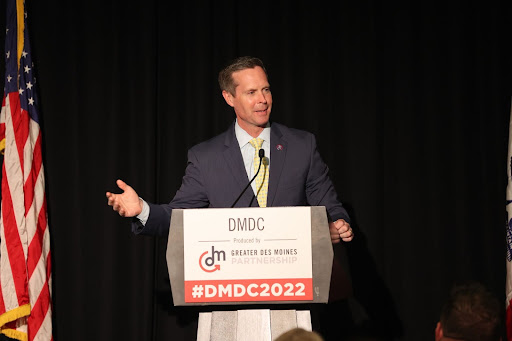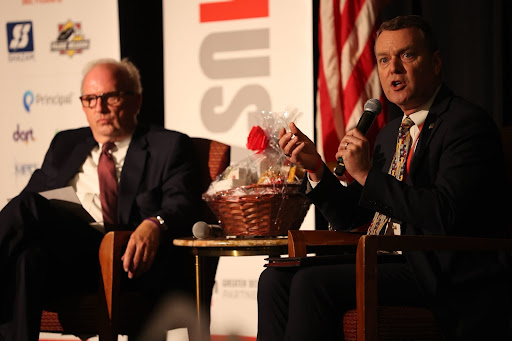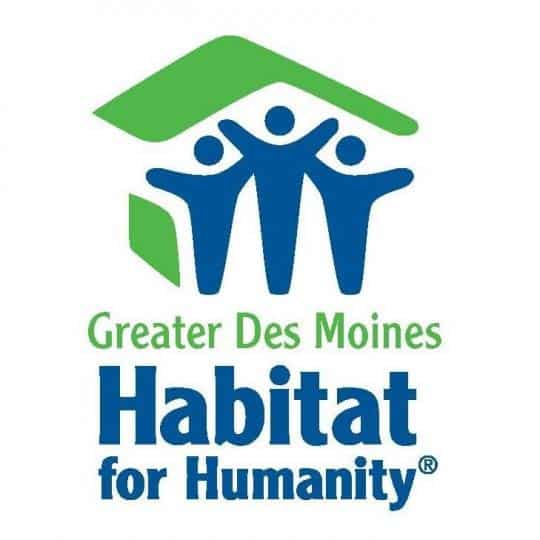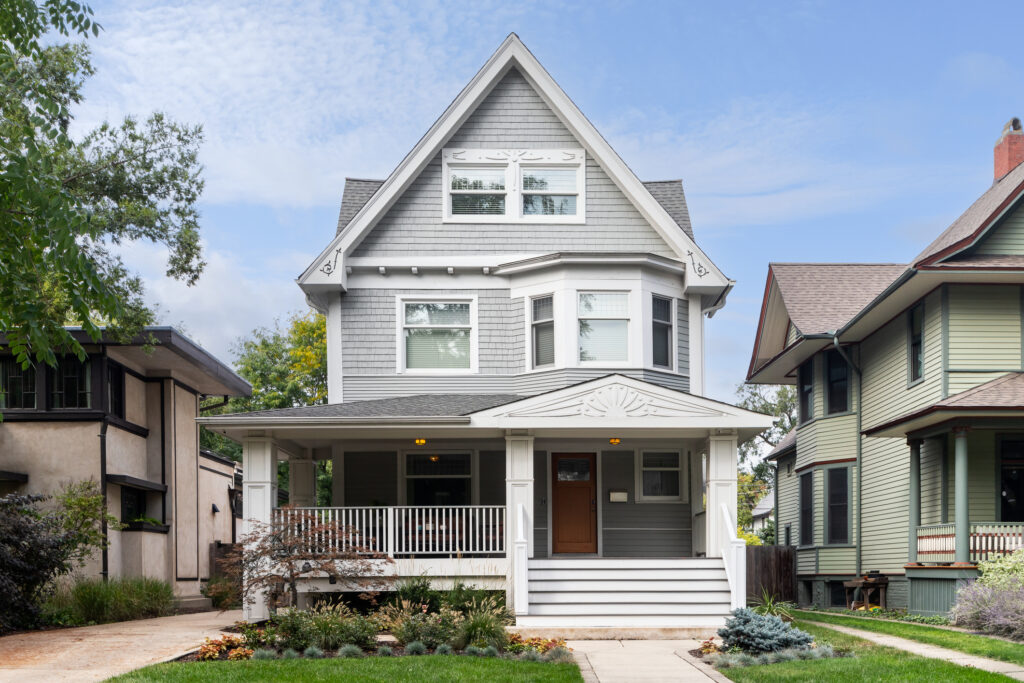Civility, building relationships a focus on day 1 of Partnership’s DMDC trip

MICHAEL CRUMB May 12, 2022 | 4:08 pm
5 min read time
1,095 wordsAll Latest News, Economic DevelopmentAbove: Scott Raecker, executive director of the Robert D. and Billie Ray Center at Drake University, right, and Jack Howard, senior vice president for strategic advocacy at the U.S. Chamber of Commerce, left, discuss civility during the first day of the Greater Des Moines Partnershp’s DMDC trip. Below: Rep. Rodney Davis, R-Ill., speaks Wednesday as part of the DMDC visit. Photos contributed by the Greater Des Moines Partnership
Civility and what can be done to restore it to the country’s political process was a message that was woven throughout the first day of the Greater Des Moines Partnership’s DMDC 2022 trip.
This is the first time in three years that the Partnership has taken the trip to Washington, D.C., in person to advocate for its federal policy priorities while providing opportunities for the more than 180 participants from Central Iowa’s business, nonprofit and educational communities to network and learn more about how the federal government works. The two previous years were canceled because of the coronavirus pandemic.
During the first day of programming Wednesday, the topic of civility was brought up several times and it was the focus of a Q&A session between Scott Raecker, executive director of the Robert D. and Billie Ray Center at Drake University, and Jack Howard, senior vice president for strategic advocacy at the U.S. Chamber of Commerce.

“No. 1, you have to want to build a relationship,” said Davis, who was born in Des Moines and lived in Iowa until his family moved to Illinois when he was 7 years old.
Davis said that when he was elected in 2012 he made a goal of getting to know other members of Congress.
“I said I want to get to know everybody that I serve with,” he said. “What I want people to remember me by is, No. 1, if you ask anybody that I serve with if they know me, the answer has to be yes. No. 2, they ought to tell you what we worked on together. That goal still stands today.”
Davis said he also brings Democrats into his district and he goes to Democratic districts to better understand “what makes them tick.”
“So I go learn about their system and they learn about ours so we can write balanced legislative proposals,” he said.
Later in the afternoon, Raecker and Howard took the stage for a conversation about civility and what can be done to elevate it at the federal, state and local levels.
“We want to be solutions-focused, and I think we’ve got great context for that in our community and in our region,” Raecker said in his opening remarks. “Clearly we know there are areas we can get better in, but the context is what are we doing that we can look to as best practices?”
Raecker cited the Capital Crossroads strategic plan as the first in the nation to elevate civility into a strategic plan.
He also announced that Drake University is partnering with the Iowa League of Cities for an annual summit on civility for municipal governance online in October. That will be followed in August 2023 with an in-person national conference.
“Nobody’s in this space. We’re going to own this space,” Raecker said. “A lot of people have been working awfully hard for decades to elevate this in our community.”
When Raecker turned to Howard, the Chamber executive talked about the Chamber’s Common Ground initiative, in which the Chamber invites one Republican and one Democrat to meet and talk about an issue they’re working together on.
“The idea is to encourage dialogue, but even that is challenging because identifying the issues that lend themselves to bipartisanship is harder than you might think, and the other thing that illustrates the problem we’re trying to solve is we ask members, ‘Who are you working with on the other side, who do you know?’ and it’s hard because Democrats say they don’t know any Republicans and Republicans say they don’t know any Democrats.”
Howard said civility begins with building relationships.
He said the U.S. Chamber’s goal in the coming months is to strengthen its relationship with House Republicans, who he believes will likely overtake control in the House in November.
“We’re not just going to sit around waiting to see who wins in November. We’re going to get ready for who wins in November, and really establish ourselves as a resource for them,” he said. “We have to do that with incumbent members of Congress, but there’s also going to be a huge class of freshman coming in in November, so we’re working closely with local chambers and other local community groups to identify those candidates, Democrat and Republican, who are willing to come to Washington and work across the aisle and pass an agenda.”
Howard said the lack of civics education in elementary, middle and high school is troubling, which has resulted in a lack of constitutional knowledge among some members of Congress.
“It’s troubling how several members of Congress are not familiar with the basics of the Constitution, which is how we ended up with Jan. 6 in a lot of ways,” he said, referring to the Jan. 6, 2021, attack on the Capitol.
Raecker asked Howard, “What can we as local leaders be doing in our community to help elevate civility?”
In answering, Howard quoted Suzanne Clark in her address after becoming the U.S. Chamber’s new president and CEO, saying, “The U.S. Chamber is calling for a new movement of bold business advocates committed to defending those elected officials who dare to find the common ground necessary to enact durable policies to move our country forward.”
“And that’s why we’re relying on our state and local chambers to help us do that,” Howard said. “It’s not only important for the business community itself, it’s important for the country.”
Howard also bemoaned what he called the decline of civil society in the U.S. and the lack of engagement on issues at the local level.
“Enough of that doesn’t happen on the neighborhood level,” he said. “I think it really starts with getting involved in school boards, getting involved in local institutions and civic groups. It goes a long way toward building those types of relationships at the local level. That’s sort of what’s happened over the years, the decline of civil society. It just doesn’t happen anymore.”











